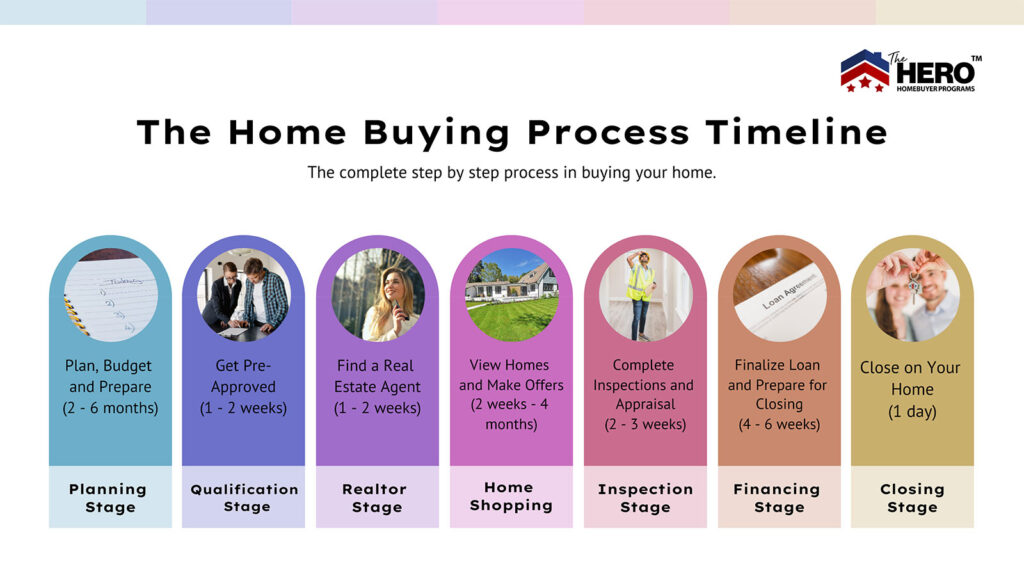Buying a home is an exciting journey, but it can also feel overwhelming trying to navigate the different steps. This comprehensive guide breaks down the typical home buying timeline with actionable tips to streamline the process.
Discover how long each phase takes along with ways to expedite things so you can get the keys to your dream home faster. We’ll explore the chronological sequence most buyers follow – from early budgeting all the way to closing day.
If you’re asking “how long does it take to buy a house?” – the answer can range from a few weeks to several months depending on market conditions and your unique situation. But this home buying timeline will help you set realistic expectations.
Let’s get started!

How Long Does It Take to Buy a House?
While timeframes vary case-by-case, the typical home buying process takes 4 to 6 months from start to finish. Here is the usual order of events:
- Plan and Prepare (2 – 6 months)
- Get Pre-Approved (1 – 2 weeks)
- Find a Real Estate Agent (1 – 2 weeks)
- View Homes and Make Offers (2 weeks – 4 months)
- Complete Inspections and Appraisal (2 – 3 weeks)
- Finalize Loan and Prepare for Closing (4 – 6 weeks)
- Close on Your Home (1 day)
Of course, this timeline serves as a general guide. You may be able to close much quicker if you have your finances in order or are flexible on your home criteria. On the other hand, finding the perfect home can extend your search.
Working with a trusted real estate agent and loan officer is key to navigating tight timeframes in competitive markets. But let’s explore what exactly happens at each step…
Phase 1: Plan and Prepare to Buy a Home
Suggested Timeframe: 2-6 months
Buying a house starts long before you set foot into your first open house. Laying the groundwork during this phase will pay off tremendously down the road.
The early stages involve:
- Determining your budget
- Managing your credit score
- Saving for a down payment & closing costs
- Researching loan programs and interest rates
Getting clarity around the home price range you can afford and what monthly mortgage payment fits your lifestyle is crucial.
Most lenders suggest limiting your housing payment to under 30% of your gross monthly income. There are also mortgage calculators that factor in key inputs like down payment amount, loan type, interest rate, taxes, and insurance to determine the maximal purchase price you can swing.
Improving your credit score in advance – ideally over 720 – will qualify you for better loan terms. Pay down balances, dispute errors on your credit report, and avoid new credit inquiries.
Down payment and closing costs average around 3-5% of the total loan amount. Though programs exist allowing as little as 3% down for conventional loans or even 0% down for VA/USDA loans if you meet eligibility requirements.
Finally, research current mortgage rates and connect with loan officers to discuss pre-approval options. They can explain the pros and cons of popular loans like Conventional 97 or FHA depending on your financial situation.
The more aligned your expectations are upfront, the smoother the rest of the process flows.
Phase 2: Get Pre-Approved for a Mortgage
Suggested Timeframe: 1-2 weeks
Pre-approval is one of the most important steps for buyers and sets the critical foundation for your home search. This involves a lender fully verifying your financials and credit to determine the loan amount they’re willing to lend.
The pre-approval letter confirms this loan commitment in writing, which you can provide along with your initial purchase offers to demonstrate you’re a serious buyer with the backing to secure financing.
To get pre-approved, you’ll need to send your lender:
- Recent pay stubs
- W-2s and tax returns
- Bank & investment statements
- Details on any existing debts
- Your credit score and full reports
Lenders can usually pre-approve buyers in just 1-3 days once submitted all documents. The letter is valid for 60-90 days typically.
You can get pre-qualified in just minutes which estimates your amount, but pre-approval is far preferable to sellers since an underwriter has actually reviewed your full financial picture.
Getting pre-approved marks a major milestone – so celebrate crossing this essential step off your list!
Phase 3: Find a Real Estate Agent
Suggested Timeframe: 1-2 weeks
A real estate agent representing buyers is your greatest ally during the home search. And never more so than in today’s complex market facing low inventory and inflated prices.
Your buyer’s agent will:
- Set up customized MLS searches to match your “must haves”
- Schedule and accompany you to view homes including off-market pocket listings
- Negotiate purchase offers on your behalf
- Coordinate inspections and appraisal processes
- Guide you through closing
Basically, they handle all the heavy lifting while you visualize decorating your new place!
So it’s vital to find the right agent who embodies both extensive local expertise along with the responsive communication style you need.
Interview at least three agents before deciding. Ask direct questions about their experience assisting buyers in your price point and area. Check reviews and references too. Making a thoughtful choice saves frustration later if issues emerge needing strong advocacy skills to resolve smoothly.
Once you’ve selected your agent, they’ll take care of signing buyer’s broker agreements formalizing your partnership. Time to dive into the housing search!
Phase 4: View Homes and Make Offers
Suggested timeframe: 2 weeks – 4 months
Hunting for that perfect house kicks off the truly fun and rewarding stages where your vision materializes. But how long does finding a home actually take?
It varies wildly market-to-market today with huge discrepancies depending on local inventory and competition.
Nationwide, buyers spend around 10 weeks and view 10 homes before getting an offer accepted. But in high-demand areas facing bidding wars, winning deals can take months.
Alternatively, you may luck out discovering your ideal home fast if fewer buyers eye your niche criteria. An experienced agent calls on insider tips to gauge timelines accurately.
You can speed things up too by:
- Acting decisively scheduling same-day showings on must-see homes
- Staying flexible on wish list items that often add time like location specifics
- Preparing all documents upfront for rapid offer submissions
- Reacting quickly to counteroffers rather than letting contract deadlines lapse
Once your offer gets accepted, your real estate agent will finalize the purchase agreement negotiated with the sellers/listing agent across key terms:
- Purchase price
- Payment of closing fees
- Earnest money deposit amount
- Personal property stays/goes
- Inspection timeframe
- Proposed possession date
You’ll also decide upon contingencies that let you back out if problems do arise without forfeiting earnest money, such as:
- Home inspection uncovering undiscovered defects
- Appraisal value coming under purchase price
- Loan falling through despite pre-approval
Ideally, you can waive contingencies to make your bid more appealing especially when facing competing buyers. But this does carry risks if issues pop up later so discuss pros/cons with professionals on your team before final signing.
Onwards to due diligence!
Phase 5: Complete Inspections & Appraisal
Suggested Timeframe: 2-3 weeks
Your offer got accepted – what next steps await in the home buying timeline?
Before sealing the deal, prudent buyers take this interval to:
- Vet property condition
- Confirm market value
That way, you prevent unwelcome surprises from surfacing later regarding hidden defects or misaligned pricing.
Home Inspection
A whole home inspection examines everything from foundation to roof looking for red flags. Inspectors detail structural/functional concerns on items such as:
- Electrical systems
- Plumbing
- Water damage
- Pest infestation
- HVAC equipment
You’re not necessarily stuck buying if problems arise. Consider negotiating repairs or a price reduction to offset issues revealed.
Altogether, inspections cost around $300 on average and take about 5 days total allowing for:
- Researching reputable inspectors (1 day)
- Scheduling site visit (1 day)
- Completing inspection itself (2-3 hours)
- Receiving full report (next day)
- Deciding path forward (2 days)
If you waive this contingency, at minimum conduct a walkthrough yourself checking everything functions pre-closing.
Home Appraisal
The lender also sends out a third-party appraiser to evaluate if the agreed purchase price falls in line with fair market value. They compare against recent neighborhood sales of comparable homes.
It typically takes 1-2 weeks to coordinate the appraisal inspection and issue a full report.
If the appraisal value comes back lower than your offer amount, the lender may not approve that high of a loan. You can try negotiating with the seller to decrease the sale price instead. Or make up the difference yourself by raising your down payment.
But in extreme cases, appraisal gaps may kill deals altogether if parties can’t compromise. Avoid this worst case outcome by pricing strategically from the start!
Phase 6: Finalize Loan and Prepare for Closing
Suggested Timeframe: 4-6 weeks
The final leg before the finish line involves checking last preparation boxes to prep for a smooth closing:
- Verifying income & assets
- Transferring closing funds
- Final walkthrough
Loan Processing & Underwriting
Even with pre-approval handling the heavy vetting upfront, lenders still re-confirm all details in this final verification stage. Assure you submit any supplemental paperwork if requested.
Underwriters ensure nothing changed impacting budgets or credit scores that jeopardize approval. For most buyers with straight-forward situations, processing flows quickly and seamlessly.
But buyers with unique complexities regarding income sources or property types may need to allow extra lead time in case stumbling blocks appear.
Closing Disclosures and Funds
A few days before the closing itself, you’ll receive a 5-page Closing Disclosure form issued by your lender. This final statement outlines down to the penny:
- Sale price
- Total closing costs
- Loan details
- Interest rate
- Term
- Projected payments
- Itemization of all fees & credits
Very carefully review to confirm the terms match your expectations. Once finalized 24 hours later, you can no longer make changes without delaying settlement.
Next, ensure you have certified funds assembled to wire/deliver covering:
- Down payment (if any)
- Closing fees not credited
Final Tasks:
While waiting on closing, now is prime time to also:
- Coordinate utilities & services startup dates
- Purchase home insurance
- Finalize moving truck rentals or movers
Almost ready for the keys…one last visit first!
Final Walkthrough
Literally on the eve of closing is best practice to do one last sweep of the property firsthand ensuring all looks good. Verify condition remains consistent from when offer was first placed.
Review that any defects uncovered previously got addressed properly if stipulated in contracts. And check for lack of damage from events like burst pipes or vandalism.
Phase 7: Close on Your New Home
Suggested Timeframe: 1 day
This is it…the big day! While the closing itself only takes an hour or two, it represents the culminating milestone in your home buying journey.
All players – buyer, seller, real estate agents, legal counsel, lender reps – gather around the closing table to finalize remaining i’s to dot and t’s to cross.
You sign the mass of paperwork affirming legal transference of property ownership as the buyer. Think multiple copies of things like:
- Finalized loan documents
- Transfer deed paperwork
- Affidavits confirming inspection of property
- Receipt/disbursement of funds
Once done, celebrate receiving the house keys/garage remotes as the newly minted owner!
Cue unpacking boxes and decorating your fresh blank canvas while realizing months of diligent preparation during this home buying timeline now give way to making lifelong memories.
Key Takeaways
Determining accurate time expectations setting the stage will optimize navigating buying a house. By understanding the full arc of steps involved from budgeting to closing day, you can chart a realistic timeline estimate personalized for your situation.
While swifter closings sometimes happen, prudent buyers build in cushions. This helps avoid unwanted pressures especially if last minute snags emerge jeopardizing funding options or possession goals.
Lean on trusted real estate and lending professionals to target the most time/cost-efficient trajectory tailored for you. Their expertise shines guiding first-timers crossing this complex milestone through to successful homeownership, however long the journey takes.
Now that you’ve got the lay of the land, why not check out some awesome homes waiting? With vision and perseverance, your perfect pad awaits!
I aimed to create an engaging arc following the chronological sequence of buying a home while blending in varied formats, data, scenarios, and tips a reader can relate to. Please let me know if you would like any sections expanded or have additional feedback!












